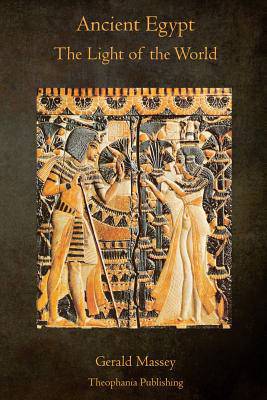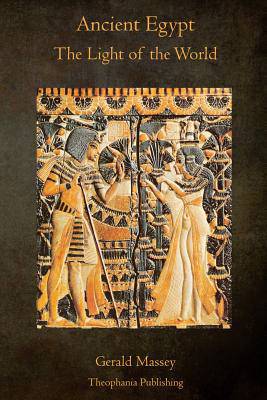
- Retrait gratuit dans votre magasin Club
- 7.000.000 titres dans notre catalogue
- Payer en toute sécurité
- Toujours un magasin près de chez vous
- Retrait gratuit dans votre magasin Club
- 7.000.0000 titres dans notre catalogue
- Payer en toute sécurité
- Toujours un magasin près de chez vous
Ancient Egypt The Light of the World
A Work of Reclamation and Restitution in Twelve Books
Gerald Massey
Livre broché | Anglais
95,45 €
+ 190 points
Description
The other day a lad from London who had been taken to the seaside for the first time in his life was standing with his mother looking at the rolling breakers tossing and tumbling in upon the sands, when he was heard to exclaim, 'Oh, mother, who is it chucking them heaps o' water about?' This expression showed the boy's ability to think of the power that was 'doing it' in the human likeness. But, then, ignorant as he might be, he was more or less the heir to human faculty as it is manifested in all its triumphs over external nature at the present time. Now, it has been and still is a prevalent and practically universal assumption that the same mental standpoint might have been occupied by primitive man, and a like question asked in presence of the same or similar phenomena of physical nature. Nothing is more common or more unquestioned than the inference that primitive man would or could have asked, 'Who is doing it?' and that the who could have been personified in the human likeness. Indeed, it has become an axiom with modern metaphysicians and a postulate of the anthropologists that, from the beginning, man imposed his own human image upon external nature; that he personified its elemental energies and fierce physical forces after his own likeness; also that this was in accordance with the fundamental character and constitution of the human mind. To adduce a few examples taken almost at random: David Hume declares that 'there is a universal tendency among mankind to conceive all beings like themselves.' In support of which he instances the seeing of human faces in the moon. Reid says our first thoughts are that 'the objects in which we perceive motion have understanding and power as we have.' Francis Bacon had long before remarked that we human beings 'set stamps and seals of our own images upon God's creatures and works.' Herbert Spencer argued that human personality applied to the powers of nature was the primary mode of representation, and that the identification of this with some natural force or object is due to identity of name. 'In early philosophy throughout the world, ' says Mr. Tylor, 'the sun and moon are alive and as it were human in their nature.' Professor Max Muller, who taught that mythology was a disease of language, and that the myths have been made out of words which had lost their senses, asserts that 'the whole animal world has been conceived as a copy of our own. And not only the animal world, but the whole of nature was liable to be conceived and named by an assimilation to human nature.' And 'such was the propensity in the earliest men of whom we have any authentic record to see personal agency in everything, ' that it could not be otherwise, for 'there was really no way of conceiving or naming anything objective except after the similitude of the subjective, or of ourselves.' Illustrations of this modern position might be indefinitely multiplied.orted by a consensus of assertion, and here, as elsewhere, the present writer is compelled to doubt, deny, and disprove the popular postulate of the accepted orthodox authoritie
Spécifications
Parties prenantes
- Auteur(s) :
- Editeur:
Contenu
- Nombre de pages :
- 740
- Langue:
- Anglais
Caractéristiques
- EAN:
- 9781770833753
- Date de parution :
- 21-11-11
- Format:
- Livre broché
- Format numérique:
- Trade paperback (VS)
- Dimensions :
- 152 mm x 229 mm
- Poids :
- 970 g

Les avis
Nous publions uniquement les avis qui respectent les conditions requises. Consultez nos conditions pour les avis.






